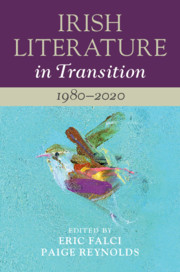Book contents
- Irish Literature in Transition, 1980–2020
- Irish Literature in Transition
- Irish Literature in Transition, 1980–2020
- Copyright page
- Contents
- Contributors
- Series Preface
- General Acknowledgements
- Acknowledgements
- Introduction
- Part I Times
- Chapter 1 The Contemporary Conditions of Irish Language Literature
- Chapter 2 The Cultures of Poetry in Contemporary Ireland
- Chapter 3 Troubles Literature and the End of the Troubles
- Chapter 4 Contemporary Irish Theatre and Media
- Chapter 5 Writing Childhood: Young Adult and Children’s Literature
- Coda: Eavan Boland and Seamus Heaney
- Part II Spaces
- Part III Forms of Experience
- Part IV Practices, Institutions, and Audiences
- Index
Chapter 2 - The Cultures of Poetry in Contemporary Ireland
from Part I - Times
Published online by Cambridge University Press: 28 February 2020
- Irish Literature in Transition, 1980–2020
- Irish Literature in Transition
- Irish Literature in Transition, 1980–2020
- Copyright page
- Contents
- Contributors
- Series Preface
- General Acknowledgements
- Acknowledgements
- Introduction
- Part I Times
- Chapter 1 The Contemporary Conditions of Irish Language Literature
- Chapter 2 The Cultures of Poetry in Contemporary Ireland
- Chapter 3 Troubles Literature and the End of the Troubles
- Chapter 4 Contemporary Irish Theatre and Media
- Chapter 5 Writing Childhood: Young Adult and Children’s Literature
- Coda: Eavan Boland and Seamus Heaney
- Part II Spaces
- Part III Forms of Experience
- Part IV Practices, Institutions, and Audiences
- Index
Summary
This essay argues that the niche occupied by contemporary Irish poetry in global Anglophone literature is a function of its formal conservatism and resistance to theoretical reflection. Irish poetry offers a moderate and palatable alternative to poetic work that works in a more thoroughgoing fashion through the violence of the present. Its conservative formalism is a hedge against confronting form with the conditions poetry must engage with. Accordingly, much of recent Irish poetry paradoxically furnishes a convenient and consumable commodity form even where it seems to offer an alternative to the economic and ecological spectacle of global transformations. But a number of poets have found formally innovative ways to accommodate both the political violence of the Troubles and the depredations of neoliberalism in Ireland while at the same time drawing on the long history of Irish resistance to such effects of colonialism and capitalism.
Keywords
- Type
- Chapter
- Information
- Irish Literature in Transition: 1980–2020 , pp. 44 - 64Publisher: Cambridge University PressPrint publication year: 2020

